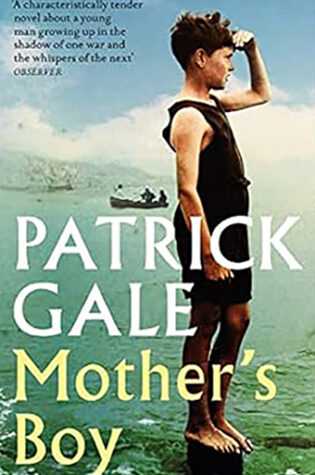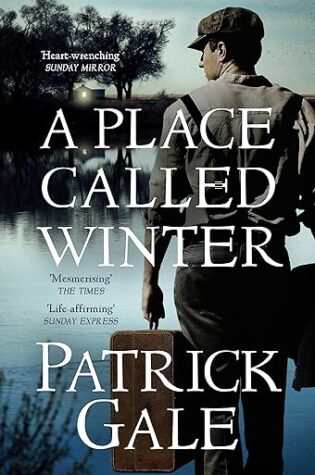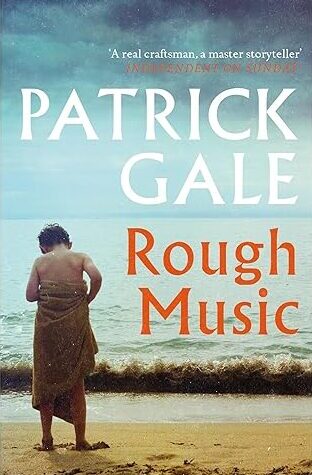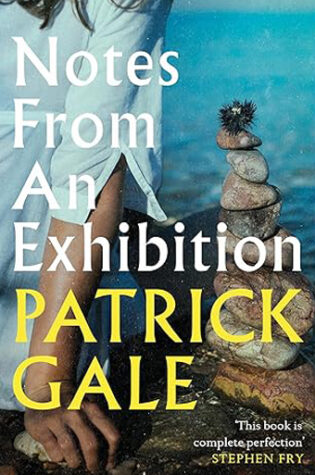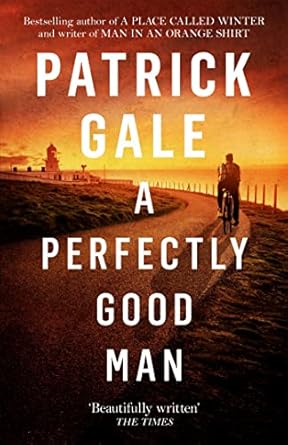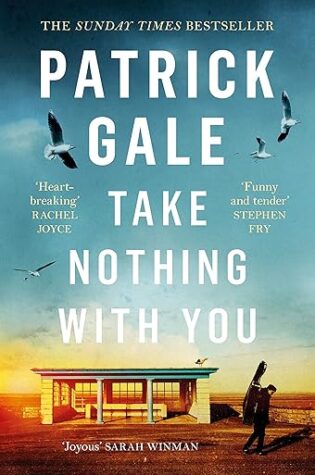Interview with Patrick Gale
Author
Questions by Peter McAllister
You’ve won and been shortlisted for lots of awards. Do you still get that buzz when a nomination comes through?
Oh, well, I should be so lucky to call it ‘lots’. It’s true I’ve been there, I suppose. I think it’s very, very sad that the Whitbread prize – which became the Costa – recently folded. Now the only really big one is the Booker, which ridiculously is shared with America. That reduces your chances of being nominated, but I live in hope. That said, I think I’m much more commercial, If I pray for something, it’s to make it into the top 10 best sellers, not just because in practical terms it repays you far more than a prize, but because it shows your readers love your work.
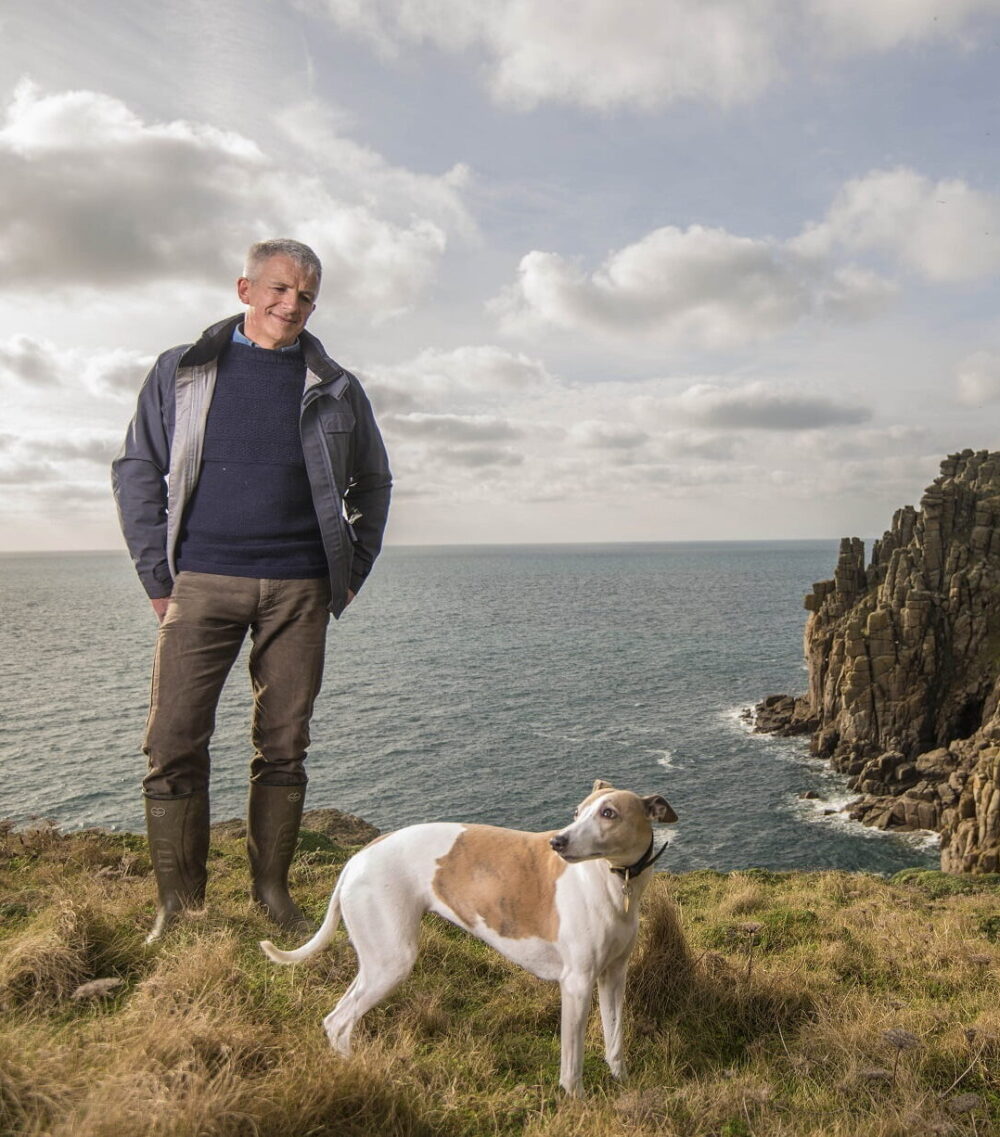
As well as your books, you’re an avid screen writer too, right? As well as adaptations of your novels, you’ve written screenplays for the BBC, Angela Pope, Fulcrum TV and Great Western Films.
Yes. It’s something I keep my hand in, and it comes and goes. The trouble with screenwriting is it’s largely speculative. The people who hire me are usually producers trying to put together a film or a TV show. In order to do that they need a script. But I’m very aware that that script is just a tool they will then use to try to raise the money and get some actors, and it may then go nowhere. So it’s fine. The money is good. It’s very good, considering, but what you write usually won’t see the light of day. It’s different with a novel; I know it’ll see the light of day. Luckily for me, I’m in that happy position.
Interestingly your first two books were published at the same time.
That’s right, but it’s not as exciting as it sounds. It actually happened because my publishers didn’t want me and were getting rid of me. It was back in the in the late 80s, when a lot of big takeovers were happening in all industries, including publishing. The long-established publisher that bought my first two books was bought by Penguin, who didn’t want me. So they published both books on the same day just to sort of sweep me off their shelf. But it did me a favour, because it got me far more reviews and attention than I deserved at that stage. It was so unusual for an emerging novelist to have two books published on the same day, so it was a gift to a publicist. Plus I was young and pretty back then, so that helped, I guess.
So given what you know now, would you recommend that as a strategy for an emerging novelist today?
Publishing two books on the same day? No, I think it’s quite wasteful. I just got lucky and those two books were very slight and very short, so they could take that that kind of treatment. I think if you write more than one novel, you should pace them out, so that they each have a good share of the market.
Great advice. So, going back to your early years… what do you think made you a writer?
Reading. I think writing and reading are the same thing, weirdly. They’re so intimately linked, I can’t really separate them. I grew up in a very, very bookish household. Everyone read. There were always baskets of library books around the house and you were allowed to read anything, pretty much, although I have quite a bossy older sister who was very clever and steered me in my early literary consumption. I’m quite aware that my first books were ones she’d passed me. I was an early member of the Puffin Club, which was Puffin Books’ brilliant way of marketing: Direct Marketing to kids, I totally swallowed it. All my pocket money was spent on Puffins. But I never thought I’d become a writer. It just seemed to emerge organically, first out of all my reading, and second from my studying English at Oxford. I was actually trying to be an actor, and writing was just something I was doing for fun, really. It still doesn’t really feel like something I should be paid to do. It feels terribly self-indulgent sometimes.
So you wrote when you were studying English Literature at Oxford?
Actually, that’s about the one time I stopped, mainly because I was too busy writing essays, but also because of the critical atmosphere that surrounds an English course. The Oxford Course is not one with any creative writing involved. And I wouldn’t have dared try to submit something creative, I don’t think. But I was always thinking about it. I had friends who wrote plays and things like that. I even acted in one of my friend’s plays and that kept me aware of the possibility of writing.
Things are changing these days though as so many universities have creative writing degrees, or modules you can do. If I was teaching English literature, I’d want all my students to have a go. It helps you understand why the good stuff is so good and how hard it is to be that good. When I think back to the Oxford English degree – which probably has barely changed since I did it – they didn’t teach you about the creative process at all; you just covered everything from Anglo Saxon to the 1960s in three years. It’s not really feasible to get a deep understanding in that time. I think if they’d taught us about the creative process all those writers had gone through, we might have gotten a deeper understanding of their work.
Thinking of your own work… Do you read reviews of your books?
I think it’s important to look, but I think the same time I’m very aware that you’re kind of hearing it too late. The time to listen to criticism is when you’re still editing. That’s why I like having a really full-on edit; I like my editor to be very careful not to hold back and to be quite blunt if need be, because that’s the time you need the criticism. You need them to say when they’re bored, you need them to say when they don’t understand. I never understand novelists who don’t like being edited – but there are plenty out there – who’d literally their hand their book over and say, ‘not a word is to be touched’. I think that’s arrogant. And foolish.
So are you able to talk through your writing process, from idea generation to completion?
Well, usually the basic story is something that comes before anything else. And that will be kicking around in my head for two or three years. Often, while I’m working on another book, or more likely, while I’m touring, promoting a previous book, I’ll be thinking all the time about this next one. The book I’m working on at the minute has been cooking up for a long time – years! It’s a sequel to a novel of mine called A Place Called Winter. It’s set in the 1950s and every character is a blood relative of mine, because it’s basically about my grandparents and my parents, all deceased. Despite that, it’s still very intimidating. Because I’ll need to make some stuff up.
So the idea brews. And then inevitably, especially with a historical novel, I need to do a lot of research before I can write a word. I have all these books kicking around my writing room about Saskatchewan, where the new novel will be set, and boxes of old letters my ancestors sent and received. I’m very lucky that my mother and my grandmother wrote to each other at least once if not twice, or three times a week, especially during the period when this novel is set. So I’ve got this fantastic way in a very direct way into their private selves. Once I’ve done all the reading, I have to push it to one side and just kind of tell the story. I have to make a structure – I’ve never been one of those writers who just sits down and writes. Perhaps it’s my music training. I like to have a form, which I get down in longhand, because that’s how I like to work.
So once you’ve hand-written the structure, you’ll then start typing up the novel?
No, no, then I’ll then write the novel all in ink. I love not having distractions, so I like to be able to have the computer switched off, and just sit on a chair and write. I tend to work from two ends of a notebook simultaneously. So I’ll take notes at one end. And I’ll just start writing from the other. But every now and then I’ll go back and make notes at the other end of the book. Once I’ve written everything out in longhand, I then type it up.
Do you not go through a period of being terrified you’re going to lose that notebook with your whole novel in it?
It becomes like an extension of my arm. I know where it is at all times and in the latter stages I take it everywhere with me. Just in case though, my writing room has an insurance policy all of its own.
Once it’s typed out, which is – in effect – a second draft, I’ll print it in really big spacing so I can then make lots of notes, ready for another draft. All my really creative work is done with a pen in my hand.
Some of Patrick's books
When you’re writing up each novel, what computer program do you use?
I just use Word. I know lots of young things love Scrivener. I tend to rely on big fat dictionaries. There’s a brilliant book I recommend to every aspiring writer, which is the Oxford Dictionary for Writers and Editors. It’s fantastic; if you pick any page, I guarantee there’ll be stuff you didn’t know. So it’s really good at categorically telling you if a certain word only has a hyphen in America and not in English. But also it can give you explanations of stuff that you might not otherwise know. It’s just really good. So I often consult that throughout a book write.
Then, I do another handwritten draft, using the notes on the typed/printed draft, then I usually try to have some time off. I think time is a really good editor. You come back and, thanks to the distance, you can see a way to fix things you weren’t entirely pleased with before.
How long a break would you take from a piece at that stage?
Maybe only two or three weeks. A short break often is all it takes. What’s especially handy is if you have a different job, or a different bit of work you have to get on with and you can just shelve the novel. My editor is very, very patient. My current book’s a year late already!
Finally I will do a neat, typed up version, incorporating all the changes. And at that point, send it to my editor and my agent.
What do your editor and agent do when they receive a draft of your book?
They each give me feedback. Assuming the book is under contract, they might try to sell foreign rights or screen rights. My editor and agent really get on, so they speak to each other about the manuscript, but my editor would then give me very detailed feedback. She’ll then do a really detailed line by line edit. And in parallel to that, usually around this point, you get a copy edit, which is very different thing. You really, really need a good copy editor. And I quite often insist on paying somebody independently of my publishers because I’m so judgmental about it because basically a copy editor is looking for things like factual errors. Especially with historical novels, it’s so easy to get things wrong. And to have somebody doing something they couldn’t possibly do, like leaving for Liverpool from Kings Cross instead of Euston or something like that. And it’s just invaluable to have those mistakes corrected.
Do you have a copy editor that you use all the time?
There’s one I want to get back to using who’s brilliant. He’s very old school, but really kind of obsessive. That is a problem in publishing, because publishing is getting very, very young. Lots of the old school editors have just left and it’s getting younger and younger and younger, which is fine, because young people have fantastic energy and new ideas and all that. But when it comes to copy editing, I think you need someone who’s quite mature because often the mistakes they’ll notice are things that younger people just wouldn’t notice. If you’re writing about the 1950s, you ideally want somebody who vaguely remembers the 50s, or at the very least has watched lots of old black and white films. So it’s, it’s a point where age is actually quite crucial.
And then you do a final, final draft?
I wouldn’t call it a final, final draft, because it will then go to print and I’ll get a set of digital proofs to correct. Normally you can only make a certain percentage of corrections at that stage before the author is expected to pay for changes. It’s very rare that happens. But that’s how publishers cover themselves in case you suddenly throw a hissy fit and say, I want to change lots. It’s just too late to do that, so you correct your proofs and I would usually do my damnedest to find somebody who hasn’t read the book or knows anything about it to correct a set of proofs. Because again, a new pair of eyes will see stuff others haven’t seen. And usually around that point, you start having to talk to the marketing department, or the design department about how the book will be packaged. How the publicity campaign they plan for it will work etc.
How much input do you have to the marketing of your books?
I make sure there’s a lot of input from me. I have very strong feelings about it. Book jackets are notoriously easy to get wrong and I’m not a designer, so I always have a very open mind. But I’m always very reassured if the editor wants to talk to me about ideas, and usually they will. The editor will bounce five or six ideas off me, having already in-house weeded out a whole load of others. I enjoy that process, I think because I’m a very visual thinker. I respond to imagery, and I like working with them on that. The publicity is a tricky one because that tends to involve a whole other element: public appearances; going to book festivals and so on. It so happens, maybe because of all the acting I did, that I’m very happy to do that. Some authors are really shy and their idea of Hell is getting up on stage and performing. I’m very lucky in that respect and I think I’m quite confident at it. I certainly get booked by a lot more festivals than most, one of which is my hometown’s fantastic Penzance Literary Festival.
You’re a fan of literary Festivals?
We’re so lucky in this country. In America, they don’t have anything like what we do here in the UK. Publishers are damn lucky because it’s a great way of selling books. And it’s particularly lovely to have it happen all over, not just in London. Cornwall, for instance, is actually a very poor region but we have some great literary festivals. Despite all the wealthy second homeowners, the basic economy of Cornwall relies totally on tourism. Book festivals are a great way of bringing money into a town or a village. And it’s not just about making money for authors – they don’t actually make that much money for authors – but they do feed into the local economy because people will be buying meals, they’ll be doing shopping on the side. They won’t just be buying books. They’ll quite often come for the weekend or for a few days and will stay in a hotel, so there’s a real benefit to having a book festival. Plus they’re fun and each one has a different identity.
the Penzance Literary Festival, I think, is really interesting in that, as well as having some big-hitting names, it’s bold about also hosting events with writers who aren’t yet published, or with writers who are not yet well known or writers who are very local. It’s a huge contrast to the North Cornwall Book Festival, which has to be rigorous about money because the festival is held in a place that isn’t really a place, there’s no identity to it’s location. The main venue is a marquee hired as a bookshop. All the authors have to be put up in places that need to be paid for, so the financial outlay is tremendous compared to doing a festival in a town. It means programming authors who are fairly sure to sell out. All real big names!
What are your top book recommendations for aspiring writers?
My main advice about reading is keep doing it. Sometimes I go and talk to creative writing students, young, creative writing students and I ask them what they’re reading, or what have they read and they often haven’t read much. They’ve watched lots of TV. But they haven’t read. I think unless you’re lucky enough to have done an old school English Literature degree, there is that incredible treasure trove of 19th and early 20th century literature just waiting for you to discover it. People like Jane Austen, Virginia Woolf, Elizabeth Taylor – who is completely out of fashion now – but actually, her books are like little jewels.
One novel in particular had a huge influence on me. Nobody has ever heard of it or the writer; I suspect it’s now out of print. I worry the writer stopped writing or died – it’s called English Weather, by Neil Ferguson. It’s the most ingenious, moving novel about a man’s life story. But it tells it in about eight different voices. So what you get in each chapter is somebody telling their story in which that man plays a part. It’s kind of like a jigsaw, and the different narratives build up a composite picture of someone. It’s really quite extraordinary, wonderful. Every time I recommend it, I think I must reread it. It’s a really good example of a very bold experimental structure. I think it’s a useful novel for people who are about to embark on their first novel, and are feeling really intimidated at the thought of writing something big. Because what you can do – and I’ve seen a few novels when people have done this – is to write a series of short stories then string them together like in Olive Kitteridge .
Some of Patrick's books
So you’re a short story fan?
One of the reasons I hardly ever say no, when I’m commissioned to write one is it sharpens things, a bit like flash fiction can. It sharpens your tools. When I’m writing a novel, my note to myself, my constant note to myself, is to make every chapter satisfying in itself, the way a short story should be. It’s difficult because in every novel, a long novel, you will always have bits where you’re treading water slightly, or bits where it’s a bit tedious, kind of on purpose, because that’s how life can be. It can’t all be at this pitch. But I think it’s really important that every chapter sings for itself.
You mentioned earlier that you have an idea rattling around in your head for a couple of years before you start working on it. But you’ve written about subjects varying from the Kindertransport to mental health, and you’re currently writing something about Canada. Can you pinpoint where the ideas come from?
I really have no idea, but they just seem to arrive. And sometimes they don’t stick around, sometimes they carbonise. For two or three years now, I’ve been cooking up an idea for a novel about a garden. I’m a kind of obsessive gardener. I think that’s born of having spent 26 years developing a garden from scratch. I’m thinking about a plot to do with a garden and a family and somebody dying and what will become of the garden, or what the future of it might be. That probably isn’t the book I’ll end up writing, but somewhere in there will be that germ of an idea that will have stuck.
So do your ideas generally come from something real in your life?
Yeah, usually either something that’s happened to me or that’s happened to a loved one or just something I’ve seen going on. The last time it was about Charles Causley. That was sort of in my life because I was working for the Charles Causley Trust. I just found I was getting obsessed. I had to write the book in order to get the obsession out. Sometimes you have to try to write something just to get it out of your system. Usually the initial idea will be very broad, and cover many decades. And the idea that I actually end up writing is really kind of drilled in, focussed. So a novel of mine, Take Nothing With You, is about a child whose life is changed by learning the cello – the original plan for that book was virtually the whole man’s life, not just his childhood. What I ended up writing was almost entirely about the childhood, seen through the lens of him as an adult.
Once you decide, ‘right, I’m going to write this story’. How long does the writing take before you give that final draft to your editor and agent?
Between a year and a year and a half. Not that long. All the thinking has gone on beforehand. I liken it to taking dictation: when I get to the stage where I’m actually writing it, if I feel I’m making stuff up I’ll stop and go back to the research, because I like it to feel as if I’m just being accurate. The story has to be so vivid to me that I’m just portraying something that’s there. That’s real. Otherwise, I feel the artifice and the effort will show in the storytelling.
Do you think that’s sometimes a downfall of less experienced writers that they just want to finish a draft too quickly?
I do. And I think quite often, they’re hungry, you know, they want to write a book they want to deliver, they want to get some money. And God knows, but you don’t get much money for a book. So the pressure is on. But I think time, for me, is what’s changed. When I look at my early novels, they frustrate me because they’re very, very short. I’m not actually drilling down into the story at all. I’m skating over the surface. And if I was to retell those, if I had to write a book now using the same plot, as those early books, there will be probably a lot more darkness. They’re all comedies, but they’re comedies about painful things. I had a breakthrough moment when I acquired a fantastic editor, a legendary editor. She was really hard on me. Emotionally, she was very astute. She got to know me quite well. And she realised I made jokes to avoid discomfort, and that I was doing the same in my writing. She didn’t want to stop me being funny occasionally, but she said, ‘You’ve got to notice what you’re avoiding writing and write it.’ So she made me put the pain in that had been missing earlier. I’m so grateful to her.
With your short story collections, how did you decide on the structure of them? Were all the stories already written and you just kind of arranged them?
For Dangerous Pleasures they were already written, I didn’t write any specifically for it. It was when I came to the second collection, Gentleman’s Relish that I had most of the collection already, but I wrote two or three, especially for the collection. I wanted it to be very dark and rather enjoyed doing that. There’s something quite dark and sinister in a lot of my short fiction, and I wanted to emphasise that.
Tell us about your radio short stories and how young writers trying to find a place for their work might go about getting something published/aired.
I mean, it’s not easy. Now, I mean. We’ve never had a short story tradition in the UK in the way America does, thanks to the New Yorker. 52 stories a year doesn’t sound like much, but when you look at the readership of that magazine, it’s a hugely influential thing. So in America, it’s possible for a collection of short stories to be a best seller. In this country there are very few notable commissioners of short stories, but one of them is BBC Radio Four. Unfortunately, they commission such short stories. I mean, they’re 12 minutes long, by and large: that’s very few words. It doesn’t lend itself then to being published in the same way as a proper length story. I find that very sad, because it means that we very rarely do see collections of short stories on the bestseller lists. We don’t have a major prize for short stories.
Publishers hate short stories, because they can’t make their money out of them. They always say, ‘oh, they don’t sell.’ But writers love writing them. And so what often happens, and it certainly happened with me, is the short story collection is a bit like the slightly dodgy gospel album, pushed through on a two album deal.
I record audio books myself, which is great fun, and I’m very lucky, I get commissioned to do it. But in the process, I’ve discovered how incredibly easy it is for any writer to record their own work. And to release it, just as you can get your books turned into ebooks. It’s a very, very cheap way to get them out there. I think, as a whole, the young generation of writers are much more alive to blogs and podcasts. So I think the great hope of the short story in this country is probably through podcasts and short stories and I I wish somebody would come along and start doing a British equivalent of the New Yorker, but as a podcast to encourage the stories to be of a good length because the joy of it is they don’t have to be a specific length – they can be as long or as short as you like.
Do you write five days a week, nine to five?
I try to. I make it as much like an office job as I can, otherwise it would just never get done. I get too easily distracted. It was a breakthrough when we were able to make me a separate office at home. I can at least come to work, physically leave the house and come to work.
I think we all have cycles in our days and some people are good in the morning and some people are definitely not. I tend to be at my best in the morning until about two o’clock. And then there’s a definite trough and then it picks up again in the evening. So if it’s a rare occasion where I’m going away on a writing retreat or my partner, Aidan is off to do an ultra marathon somewhere, I will write at night and get quite excited by the work I do then. It’s silly but it feels very unsociable if we were both at home and I was writing at night.
Last question: best bit of advice for upcoming writers?
Get it done. And then do something else. People always ask me how they can publish their first novel and I always say, ‘Just don’t forget to write your second novel.’ Don’t wait, because the process of finding a publisher or an agent can be so slow, you need to get on with another, just to remind yourself that you enjoy doing it. If you put all your focus on that one piece of work and it gets turned down – which it will do by two or three, maybe twenty people before getting accepted – it would be completely soul destroying if you weren’t also working on something else.
About Patrick Gale
Patrick Gale is a keen cellist, gardener and artistic director of the North Cornwall Book Festival. He lives with his husband, the farmer and sculptor, Aidan Hicks (www.aidanhicks.com), on their farm at the far west of Cornwall. In addition to his latest, Mother’s Boy, which is published on March 1 2022, his seventeen novels include Take Nothing With You (2018), which was his fourth Sunday Times bestseller, Rough Music (2000), Notes From an Exhibition (2007), A Perfectly Good Man (2012) and A Place Called Winter (2015). In 2017 his two part drama Man in an Orange Shirt was screened by BBC2 as part of the Gay Britannia season. Continuing to be broadcast regularly around the world, this won the International Emmy for best miniseries and is now in development as a musical. He is currently working on a television adaptation of A Place Called Winter and a stage version of Take Nothing With You. Extracts from the BBC documentary All Families Have Secrets – the Narrative Art of Patrick Gale can be seen on his website www.galewarning.org.


